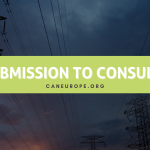This letter and attached briefing outlines key recommendations from African and European CSOs on the proposed EU African Green Energy Initiative, financed through support from the EU budget and under the forthcoming EU Africa Partnership Strategy. The recommendations include:
- Ensure and respect African ownership, multi-stakeholder partnerships and civil society participation
- Build on African initiatives to deliver on African needs and interests, Agenda 2030, and tackle inequalities
- Prioritise access to clean energy, renewables development and energy efficiency first
- Strengthened approach to gender responsiveness
- ‘Do no harm’ via the strongest social and environmental safeguards
Brussels, 15 March 2021
To: Director Generals INTPA, NEAR
CC: Deputy Director-General Directorate F, INTPA; Deputy Director-General Southern
Neighbourhood, NEAR; European Council Working Groups: COAFR, DEVGEN, ENER
Dear Director-Generals,
We write to you as representatives of 13 civil society organisations from Africa and the EU working to accelerate the energy transition in both Africa and the EU toward 100% renewables based and energy efficient energy systems. We understand that an EU Africa Green Energy Initiative has been proposed in the forthcoming EU Africa Partnership Strategy.
Since resilient energy systems will form the backbone of a green recovery, and can support improvements across key recovery sectors including health, digital and agri-food systems, it makes sense that the EU improve its package of support to green energy through the new Partnership Strategy and the programming of the Global Europe Instrument.
The EU should support the development of the large potentials of renewable energy sources, primarily solar, wind and geothermal in Africa; to tackle energy access; in alignment with energy efficiency; in a way that supports decent job creation across Africa. Renewable energy planning needs to be aligned with energy efficiency to reduce the supply side investments exigencies in a continent that is still energy-poor and that will grow its energy demand significantly. It is important that EU support takes tailored approaches in different regions, focusing on energy efficiency and the just transition out of fossil fuel based energy in North Africa and South Africa, while Sub Saharan Africa faces greater challenges on energy access.
However we have strong concerns around the development of an initiative which seems to be EU-led, since our understanding is that there has been minimal interaction with African leadership, and none with African civil society on the initiative as such. To ensure EU support delivers on Agenda 2030, and supports the green economy and industry in Africa, it needs to be re-configured to service African energy needs first and foremost, have a stronger focus on tackling inequalities, and support African-leadership and ownership through multi-stakeholder partnerships and civil society participation.
We therefore put forward key recommendations which are provided in further detail in the Annex to this letter:
- Ensure and respect African ownership, multi-stakeholder partnerships and civil society
participation - Build on African initiatives to deliver on African needs and interests, Agenda 2030, and
tackle inequalities - Prioritise access to clean energy, renewables development and energy efficiency first
- Strengthened approach to gender responsiveness
- ‘Do no harm’ via the strongest social and environmental safeguards
We strongly urge the EU to revise its approach through consultation and close dialogue with African stakeholders, parliamentarians and decision-makers, through the programming of the Global Europe Instrument and through formal consultations on the EU Africa Strategy that seek to build on the already existing frameworks and with African interests at the forefront.
We hope we can work with you to ensure the acceleration of the African energy transition with public common good and well-being, and genuine and equal partnerships with Africa at the core. We hope that you can take these recommendations into consideration and would be happy to collaborate by providing further insights.
Yours Sincerely,
CSOs working on Africa Renewable Initiatives.
Signed and supported by:
Augustine Njamnshi, Coordinator, African Coalition for Sustainable Energy and Access (ACSEA)
Massinissa Sebai, President, Association AGIR pour le développement & l’épanouissement de la jeunesse
Dr Najoua Bouraoui, Head of APEDDUB, Assocation pour la Protection de l’Environnement et le Développement Durable de Bizerte (APEDDUB)
Dramane Coulibaly, Regional Coordinator, Centre d’Études et d’Expérimentations Économiques et Sociales de l’Afrique de l’Ouest – Association Internationale (CESAO-AI)
Titilope Akosa, Exeutive Director, Centre For 21st century Issues (C21st)
Josianne Gauthier, CIDSE Secretary General
Wendel Trio, Director, Climate Action Network Europe
Dr Ahmed Hegazi, Egypt Green Energy Association, NGO
Christoph Bals, Rixa Schwarz Germanwatch
Yossef Ben-Meir Ph.D. President, Imane Akhezzane, Programs’ Director, High Atlas Foundation (HAF)
Dr. Bernd Bornhorst, Head of Department Policy & Global Challenges and Peter Meiwald, Head of Africa Department, Bischöfliches Hilfswerk MISEREOR e.V. (the German Catholic Bishops’ Organisation for Development Cooperation)
Mohamed Adow, Director, Power Shift Africa
Nobert Ochieng’ Nyandire, National Coordinator, Sustainable Environmental Development Watch (Suswatch Kenya)



